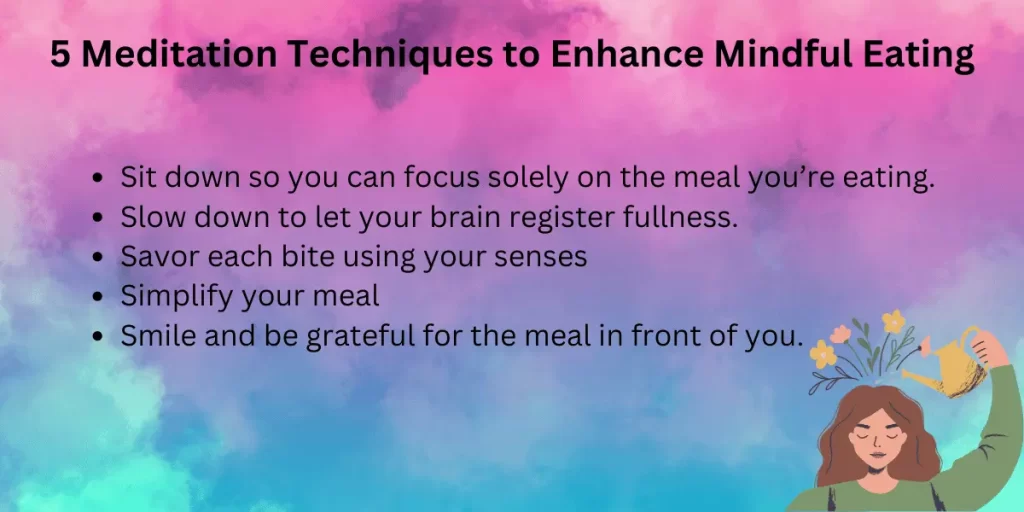Many people do not know what is called mindful eating. In reality, such practice can help you enjoy your meal more.
How do meditation and mindful eating help us eat healthily? That is precisely what this blog post will cover.
Mindful Eating – Just a Diet Trend or More?

People often mistake mindful eating for dieting, this is wrong. Mindful eating involves making healthy food to better our lives.
Definition and core principles of mindful eating
Mindful eating is when you are present with your food or meal. That is, you now become more aware of your eating experience. Mindful eating teaches you to observe your food intake.
Its core principles include:
- Considering and listening to your body’s signals
- Optimizing your senses to enjoy your food in its entirety
- Eating without distractions
- Cultivating appreciation for the food
- Recognizing emotions that drive your eating habits
The Connection Between Meditation and Mindful Eating Practices
When you integrate meditation and mindfulness practices into your meal, it enriches your relationship with food. That’s not all, it helps you both in physical and mental ways.
Meditation and mindful eating help your body to flourish. You tend to get a balanced diet and the right nutrients. This practice is not just about choosing the right kinds of food. It is about savoring each bite to nourish our bodies as it should.
The Science Behind Mindful Eating

The way food works in our bodies is just wonderful. Lots of research is being done to understand the process. Thankfully, results are proving that mindful eating has amazing benefits. Knowing these benefits will transform your entire life.
Benefits of Mindful Eating According to Research
Various comparative effectiveness studies have demonstrated that mindful eating can treat chronic disease management. It also helps in managing weight and changing eating behaviors.
Reports from across the world note that adults with type 2 diabetes can benefit from mindful eating. Additionally, those who suffer from eating disorders can improve their condition when they eat mindfully.
Eating disorders and mindless eating habits – Statistical Reports
A certain report was made by the Centre for Disease Control. It stated that one-third of Americans are obese. And, heart-related issues is responsible for 1 out of every 4 deaths in the US.
Various scholars have estimated that binge eating happens to almost 60% of the world’s population. In the US, approximately 2.8 million people have a bad eating disorder.
5 Meditation Techniques to Enhance Mindful Eating

Mindful eating techniques are called the 5 S’s. They are:
- Sit down so you can focus solely on the meal you’re eating.
- Slow down to let your brain register fullness.
- Savor each bite using your senses
- Simplify your meal
- Smile and be grateful for the meal in front of you.
Other helpful techniques are highlighted below:
Guided meditations for pre-meal awareness
Before you begin a meal, guided meditation sessions will help to ignite your nervous system, allowing you to process the food better. It relaxes your mind so that your nutrients can be easily absorbed in your body. Furthermore, it helps to solve digestive issues.
Apps like Insight Timer offer free guided meditations for mindful eating. These are in form of videos that you can play in the app or listen offline.
Breath-focused exercises during meals
During meals, breathing exercises like deep breathing help to improve digestion. In addition, it helps you eat with intention and attention, truly experiencing the pleasure of eating. Here’s how to do a simple exercise:
- Look for a quiet place to sit so you can have your meal
- Slowly breathe in and out and enjoy every bite like it’s going to be your last.
- Notice and pay attention to the sensations of the food. For instance, the color, taste and aroma are things that makes the food what it is.
- Connect with the food and let it impact your body and mind.
Body scan practices for hunger and fullness cues
Body scan technique helps you know when to eat and how much to eat. It connects you to the nourishment of the food you just enjoyed and reduce unwanted cravings. It also helps you build appreciation and gratitude for the food, enriching your entire body. To perform a simple body scan practice:
- Sit as usual and take in deep breaths
- Start scanning from your head, then down to your face, neck, shoulders, belly, legs and feet.
- Pay close attention to bodily sensations especially the one in your stomach. Does it sound like you’re hungry or full? (You can place your hand on it if you want)
6 Ways to Practice Mindful Eating Exercise

- Allow your body connect with your brain. Don’t ignore your body signals when you’re full and don’t rush over the food.
- Know your body’s hunger signals and know that they are different from cravings.
- Eat at consistent time and at consistent places. Sit down and serve the food in a nice way. Moreover, eating with others is also a good way to cultivate mindfulness meditation. And we will not forget, cleaning up the kitchen space and making it look presentable.
- Eat foods that are nutritionally healthy and not one that emotionally comforts you.
- Connect with your food on a deeper level
- Attend to the meal in your plate without distractions like screen time.
Breaking Free from Diet Culture: Mindful Eating as a Lifestyle
Our world is totally obsessed with the right body shape, size, and weight. It has adopted a method of ‘diet culture’ to achieve this. But, it is essential to note that this has done more harm than good. Diet culture promotes restrictive eating habits and unrealistic body standards that harm us mentally.
It is a set of beliefs that claims you need to be thin to stay healthy. Even worse, it is a mindset that is affecting the whole of society today. If you’ve been a victim of this, you need to break free. If you don’t know how to, help has arrived.
Contrasting mindful eating with traditional dieting approaches
Traditional dieting is a type of diet that follows a set of rules to achieve weight loss and these rules are pretty restrictive. For instance, low-carb diets, low-fat diets, and others aims to achieve a specific body shape. They do not really focus on listening to the feelings of fullness. You just need to know what and how much to eat.
However, this approach to eating can cause people to have increased food cravings and disordered eating patterns. It is also possible that people will develop a negative body image due to comparison. Lacking essential nutrients from excluding certain food groups is also possible.
Mindful eating, however, can help your physical and mental health. Compared to the former, this one is more sustainable in the long term. Experts also recommend mindful eating practices can help people develop a body-positive mindset.
Overcoming emotional and binge eating through mindfulness
Mindfulness helps in reducing binge eating in the following ways:
- It makes us aware of what triggers emotions. This alone makes it difficult for us to overeat.
- Mindfulness encourages us to pause and consider why we want to eat.
- It helps you be in the moment without judgment.
- It helps you reconnect with your body’s internal cues.
Your 7-Day Mindful Eating Plan To Becoming a Mindful Eater
For the next 7 days, focus on this simple mindful eating plan to hone your skills.
Day 1 & 2: Eat without distractions which include TV, phone or work.
Day 3 & 4: Breathe in deeply before you start your food.
Day 5 & 6: Chew slowly and intentionally.
Day 7: Eat mindlessly on this day. Then compare results with what you did from day 1 to day 6.
Daily guided meditations for mindful eating
- Make use of guided meditations – led by a coach or through audio recordings. These guided sessions offer instructions to help you focus on the experience of eating.
- Allocate specific times that you would love to eat consciously and stick to it.
- Adopt other exercises like mindful breathing. This can help channel your focus on the present moment.
Tracking progress and overcoming common challenges
While mindful eating is beneficial, some may experience challenges like finding time and maintain consistency. That can be overcome when you (i) plan right (ii) set realistic goals and (iii) seek support from professionals and mindfulness communities.
Track your progress to know how far you’ve gone. Doing this also makes you aware of the obstacles you’ve encountered and how to overcome them. More so, you tend to build motivation and confidence in yourself.
How Mindful Eating Benefits Us
- Mindful eating improves nutrient absorption. Furthermore, it reduces digestive issues like bloating.
- It supports weight management as you pay attention to your hunger cues.
- Eating consciously is one of the ways you can increase the enjoyment of your food.
- It helps you overcome emotional eating.
- It strengthens your connection and relationship to food.
- Eating mindfully increases your mindfulness in other areas. This helps to reduce stress and improve focus.
- It enhances satisfaction and fullness.
- It leads to healthy food choices and overall health.
Mindful Eating & Eating Disorders
There is a strong significance between mindful eating and disordered eating. Those who do not eat mindfully think about food in a negative way. This can trigger bad eating habits. With mindful eating, you can counteract these patterns and live happily.
However, mindful eating is not a one-size-fit approach to every problem. It may not be good for everyone. On occasions, seeking professional help alongside practicing mindfulness can help.
Mindful Eating Tips for Real-Life Situations
Eating out scares some people who wants to stick to mindful eating. Is this also a problem for you? Then, you can make do with the following tips:
Navigating restaurants and social gatherings
- When attending social events, ensure your stomach is not completely empty. This will make sure you do not consume too much.
- Try new dishes; check in with your body and tune in to your hunger and fullness levels. Make your choices accordingly.
- When eating with others, become present in the moment. Engage yourself in the conversation.
- When visiting restaurants, check out the menu ahead of time so you can assess your options successfully.
- Stick with the main meal or share a dish with others.
- You don’t have to finish a meal because it is served to you. Take it home and finish it when you want to.
Incorporating mindfulness into busy schedules
- Set small, manageable reminders throughout the day so you can remind yourself to slow down and eat.
- Start small, perhaps with just one mindful meal a day. As you progress, you can gradually increase it.
- Activate your full senses to enjoy the food to the fullest.
- Chew slowly and thoroughly as this helps with digestion.
- Appreciate your food before and after you eat.
How Mindful Eating Impacts Our Health
Research has discovered that mindful eating can impact our holistic health. How does it do that? Let’s take a look at some ways in a flash.
Better digestion and nutrient absorption
Mindful eating helps you eat at a slower pace which helps food to be broken down properly. Digestion starts at the mouth so eating more slowly improves digestion. It can also reduce stress, which negatively affects digestion. Stress-free eating improves digestion as well. Additionally, it leads to healthy eating which is beneficial for digestive health.
Mindful eating helps you make good food choices. This means you will receive the essential nutrients needed in your body for optimal function. You will be able to achieve a balanced diet that supports nutrient absorption. Mindful eating recognizes that a body needs hydration. This, in turn, supports the transportation of nutrients through your system.
Increase awareness and compassion
Eating mindfully makes you notice the body’s physical cues. This awareness is extended to other bodily sensations, stopping you from eating badly. With this awareness, you can respond to emotional triggers with mindfulness and self-compassion.
Exploring Mindful Eating Courses and Resources
Want to start your meditation and mindful eating journey? Don’t know how to navigate through the ocean of resources? No stress, we’re here for you. We’ve done the work – surfing the net for helpful apps and resources that can help.
Online programs and apps for guided practice
Apps like Headspace, Calm, Am I Hungry? ® Virtual Coach and others contain guided sessions for beginner’s assistance. It helps to resolve mindless eating. Headspace, for instance, even has a sample eating plan to guide you in the process.
Online programs like the 8-Week Mindful Eating Program are also available. Programs like these can help you apply mindfulness and mindful eating. These consist of video training and transcripts that can be downloaded and used offline.
Books and podcasts to deepen your understanding
For more info on meditation and mindful eating, you can listen to podcasts like Atomic Habits, The Omnivore’s Dilemma, and In Defense of Food.
Online books like Intuitive Eating: A Revolutionary Anti-Diet Approach are also powerful in deepening your understanding of the subject.
Mind you, some of these come with no extra cost, just your phone and internet connection. Explore these options, practice eating mindfully, and your health with thank you.
Frequently Asked Questions(FAQ’s)
i. don’t watch the screen while you eat ii. sit down to eat iii. chew your meal slowly iv. serve the correct amount
Listen to your body signals and don’t go for the cravings. Use your senses to gain full experience of food. Cultivate a sense of gratitude and eat in right proportions.
Research shows that mindful eating is linked to weight loss and fat loss.
It is a method that involves focusing your full attention on each of your senses as you eat a raisin.
It has been studied that a mindfulness diet can lead to weight loss.
While the former focuses on the process of eating, the latter focuses on the outcome.
i. start with a limited portion ii. engage your senses while eating iii. appreciate your food


I have been impressed after reading this because of some quality work and informative thoughts. I just want to say thanks to the writer and wish you all the best for coming! Your exuberance is refreshing.